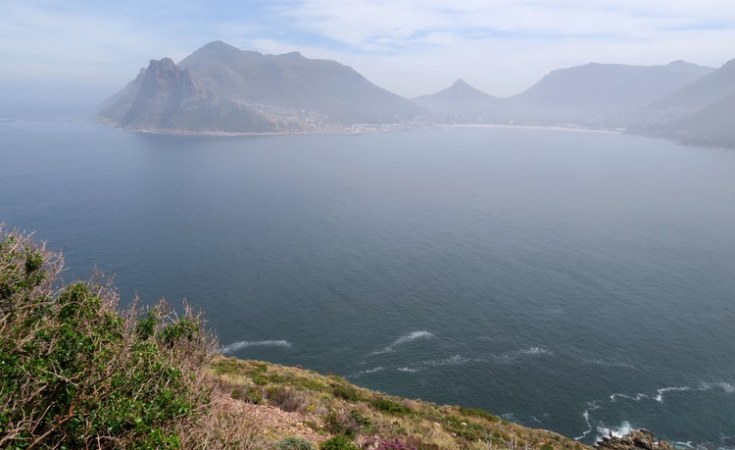The City of Cape Town's own data shows it is releasing more sewage than is allowed
- The City of Cape Town has been pumping more sewage into the sea at Hout Bay than it is allowed to do.
- Data obtained by Action SA shows the City has contravened the discharge permit granted by the Department of Forestry, Fisheries and the Environment.
- ActionSA has laid a criminal charge for violation of the Integrated Coastal Management Act.
The City of Cape Town has been pumping more sewage into the ocean at Hout Bay than is allowed, the City's own data reveals. And the sewage does not meet the minimum standards for effluent discharge.
Raw sewage from Hout Bay is pushed through a three millimetre grid to remove solids, and then pumped through a pipe that extends 1.7km out to sea at a depth of 37 metres. This is one of three such marine sewage outfalls in Cape Town, the other two being at Green Point and Camps Bay.
The permit for the release of sewage through the Hout Bay marine outfall was granted by Minister of Forestry, Fisheries and the Environment (DFFE) Barbara Creecy in 2019. Permits for the Green Point and Camps Bay outfalls were granted in December 2022 and January 2023 respectively. Creecy has since ordered the City to undertake a public participation process in relation to the issuing of the permits. The public participation process ends on 21 November.
But according to information from the City obtained via a Promotion of Access to Information Act (PAIA) application by ActionSA provincial chairperson Michelle Wasserman, the City has been violating special conditions included in the marine outfall discharge permit for Hout Bay.
ActionSA has now laid a criminal charge for violation of the Integrated Coastal Management Act.
The data and documents obtained by Wasserman show that the City pumped more than the maximum allowed volume of five million litres of sewage per day from the outfall on 104 out of 181 days in the first six months of this year. On six of these days, the City released more than double the allowed maximum volume of sewage into the ocean, releasing as much as 12.5-million litres on one day. The pipe is designed to manage a maximum of 9.6-million litres a day.
Over the six-month period, the City released over one billion litres of sewage through the Hout Bay outfall. At five million litres a day, the maximum allowed flow for the period is 905-million litres.
According to the permit conditions, the maximum allowed volume must not be exceeded without authorisation from the DFFE. Wasserman says the City told her "no authorisation was received".
The data provided by the City also shows that sewage quality did not meet minimum standards.
Levels were exceeded for the amount of suspended solids in the sewage effluent, the chemical oxygen demand, and the pH. On some days these levels were not even measured. No results were provided for the levels of arsenic, cadmium, calcium, copper, chromium, cyanide, or mercury, all of which are supposed to be measured weekly.
The permit granted by the DFFE in 2019 stipulates that the City must set up or join a Permit Advisory Forum within six months of the permit being granted. The forum must meet at least four times a year to discuss any breaches of the permit conditions, monitoring and reporting requirements, and any general issues related to the outfall. But in response to Wasserman's PAIA request for information on this issue, the City responded with an incomplete sentence: "The City of Cape Town has previously reached out to."
"From the City of Cape Town's response, it is clear that this important oversight body required by the Permit was never established," stated Wasserman in her affidavit to the police submitted on 2 November.
Wasserman notes in her affidavit that the City's failure to comply with the conditions of the outfall discharge permit means it falls foul of the Integrated Coastal Management Act of 2008. She has asked the police to investigate the contravention of the Act.
Wasserman said she did not submit a PAIA request for the monitoring results of the Green Point and Camps Bay outfalls as the permits for these were only issued in December 2022 and January 2023, so a significant amount of data from monitoring would not yet have been collected.
City responds
City water and sanitation mayco member Zahid Badroodien said, "The City continues to operate the marine outfalls with current permits and licence conditions as issued by the Department of Water and Sanitation/DFFE."
Badroodien said the City welcomed Minister Creecy's determination that the City should conduct a public participation process on the granting of permits for the three marine outfalls in the city.
He said the City has also commissioned a study to determine the feasibility and cost of treating the sewage before releasing it into the ocean, or alternatively, pumping it to existing sewage treatment works. A draft scoping report for the study was under review, he said, and once the report was finalised there would be further community engagements regarding the outfalls.


